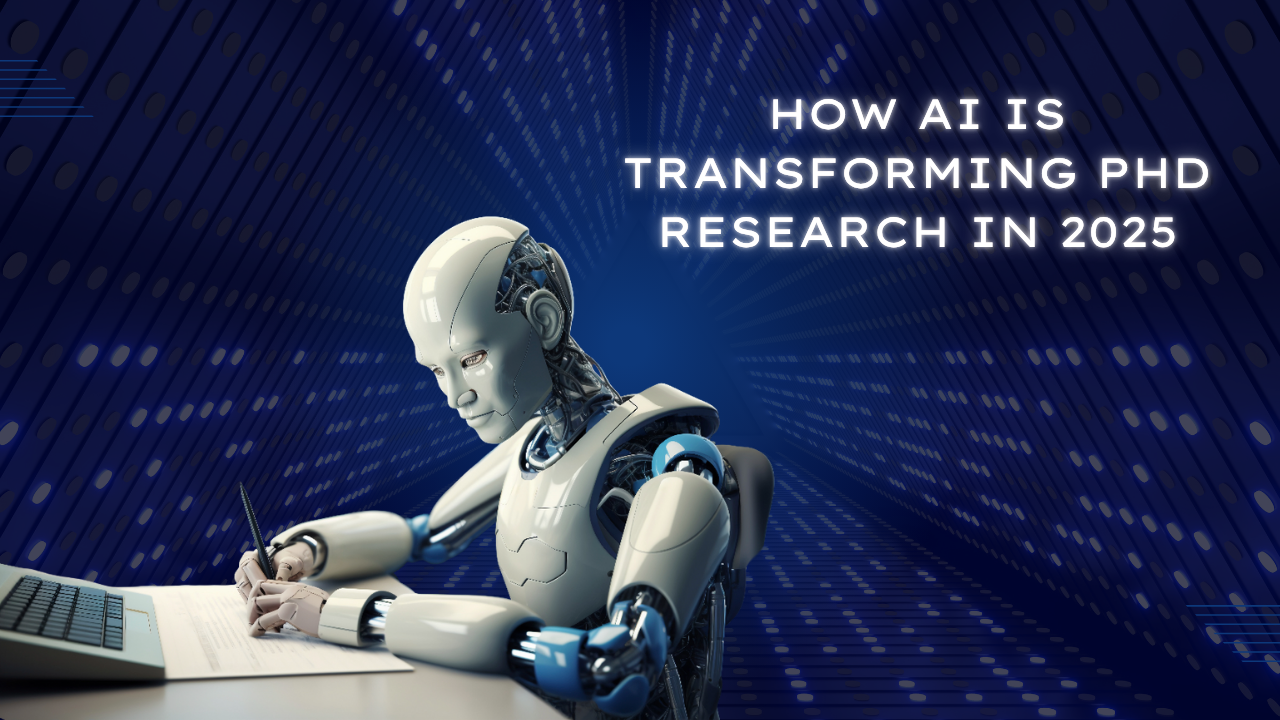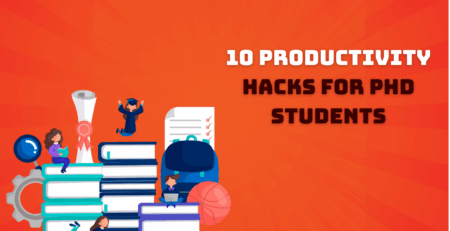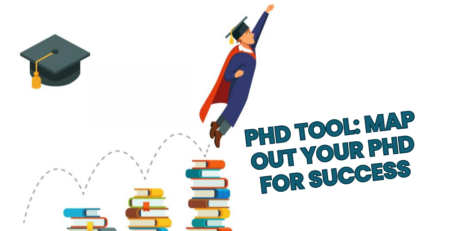How AI Is Transforming PhD Research in 2025
Kenfra Research - Shallo2025-06-26T16:48:06+05:30The world of academic research is undergoing a profound transformation, and artificial intelligence (AI) is at the heart of it. For PhD scholars, AI Is Transforming PhD Research by becoming more than just a futuristic concept—it’s a real-time research partner, helping with everything from literature reviews to data analysis and even thesis writing. In 2025, AI Is Transforming PhD Research by integrating smart tools that reshape how scholars conduct research, save time, enhance accuracy, and increase productivity.
In this blog, we explore how AI is revolutionizing PhD research in 2025, the benefits and challenges it presents, and how researchers can harness its potential to maximize their academic success.

1. AI-Powered Literature Review and Topic Selection
Finding the right research topic and conducting a comprehensive literature review is often the first hurdle in a PhD journey. Traditionally, this process takes weeks or even months. But in 2025, AI-driven literature analysis tools like Semantic Scholar, Elicit, and Scite can scan thousands of academic articles in seconds, identify trends, and summarize findings.
Key Benefits:
- AI identifies gaps in the existing literature, suggesting novel research areas.
- Natural language processing (NLP) helps scholars summarize articles, extract key insights, and avoid redundant reading.
- Topic modeling algorithms guide researchers to niche research areas with high relevance and originality.
Example:
A PhD student in climate science might use AI to scan over 50,000 papers and discover an under-researched sub-topic related to urban heat islands in tropical cities—something that might take months to find manually.
2. Data Collection and Analysis: Smarter and Faster
In 2025, researchers no longer have to spend days cleaning data or writing complex code from scratch. AI-powered platforms such as IBM Watson, Google Vertex AI, and open-source models like ChatGPT-4o help researchers clean, categorize, analyze, and visualize data with minimal effort.
Key Benefits:
- AI automates repetitive tasks like data cleaning and preprocessing.
- Machine learning models assist in predictive analytics, statistical modeling, and trend analysis.
- AI tools like Tableau GPT and Power BI Copilot generate interactive visualizations instantly.
Example:
A sociology PhD student conducting survey research can use AI to process responses, detect patterns, and create charts, turning raw data into insights in a matter of minutes.
3. Academic Writing Assistance: From Drafting to Editing
AI writing tools are among the most game-changing developments in academic research. In 2025, tools like Grammarly, Writefull, Trinka AI, and ChatGPT assist with paraphrasing, grammar correction, citation formatting, and even thesis structuring.
Key Benefits:
- AI tools improve clarity, coherence, and academic tone.
- Citation management is made easier with automatic APA, MLA, or IEEE formatting.
- AI helps prevent plagiarism by rewriting and checking similarity scores.
Bonus Tip:
While AI can assist with writing, originality and critical thinking still lie with the scholar. AI should be used as a co-pilot, not a substitute for genuine research.
4. Code Generation and Simulation Support
PhD students in fields like computer science, engineering, and bioinformatics benefit immensely from AI tools that generate code, simulate models, and even debug errors.
Examples of AI Tools in Use:
- GitHub Copilot for Python, R, MATLAB, or C++.
- Code Interpreter tools to test hypotheses and run simulations.
- MathGPT or Wolfram Alpha for solving complex equations.
Whether you’re running neural networks, building simulation environments, or testing computational models, AI dramatically cuts down development time and boosts productivity.
5. Personalized Research Support and Time Management
AI assistants in 2025 don’t just help with research—they help with planning and productivity. Tools like Notion AI, Motion App, and SaneBox AI automate scheduling, prioritize tasks, and organize your research life.
Features:
- AI recommends weekly research plans, tracks deadlines, and sends reminders.
- Personal bots organize notes, references, and reading lists.
- AI-enhanced calendars sync research milestones and meetings seamlessly.
This helps PhD scholars maintain work-life balance, reduce burnout, and increase focus.
6. AI in Academic Publishing and Peer Review
The process of academic publishing has also evolved with AI. Journals are using AI-assisted peer review to detect potential plagiarism, ethical issues, and even flag questionable data.
For Researchers:
- Tools like Research Rabbit and Connected Papers help identify relevant journals.
- AI checks readability scores, formatting, and submission readiness.
- Some platforms predict acceptance probability based on journal scope and article quality.
PhD scholars can now submit with greater confidence and less guesswork.
7. Enhancing Collaboration and Networking
AI platforms also support collaboration among researchers worldwide. Through AI-powered research hubs and language translation tools, geographical and linguistic barriers are shrinking.
Notable Tools:
- ResearchGate AI recommends potential co-authors.
- AI translates research papers into multiple languages in real time.
- Collaboration tools like Overleaf GPT help co-write and edit LaTeX documents seamlessly.
This enables interdisciplinary and cross-border collaboration on a scale never seen before.
8. Ethical Considerations in Using AI for Research
With great power comes great responsibility. AI introduces ethical dilemmas such as data bias, overreliance, and authorship attribution.
Ethical Guidelines:
- Always cite AI tools used in writing or analysis.
- Use AI for support, not for falsifying results or fabricating data.
- Institutions and publishers are developing AI usage policies to ensure academic integrity.
PhD researchers must be transparent and responsible when integrating AI into their workflow.
9. AI for Accessibility and Inclusion in Academia
AI is also helping to make academia more inclusive. Tools like speech-to-text, screen readers, and multilingual translators support scholars with disabilities or language barriers.
Benefits:
- Improved access for visually/hearing-impaired scholars.
- Real-time translation enables global knowledge sharing.
- Adaptive AI tutoring systems help students learn at their own pace.
By leveling the playing field, AI makes research more accessible to everyone, everywhere.
Final Thoughts: Embrace the Change with Kenfra
As we move deeper into the AI era, AI Is Transforming PhD Research in 2025 in ways that make it look nothing like it did just a decade ago. AI isn’t replacing scholars—it’s empowering them to think deeper, move faster, and achieve more with fewer constraints. Yet, even as AI Is Transforming PhD Research, navigating this AI-powered research landscape can still be overwhelming.
Kenfra Research understands the challenges faced by PhD scholars and offers tailored solutions to support your academic goals. From topic selection to advanced plagiarism checking.












Leave a Reply